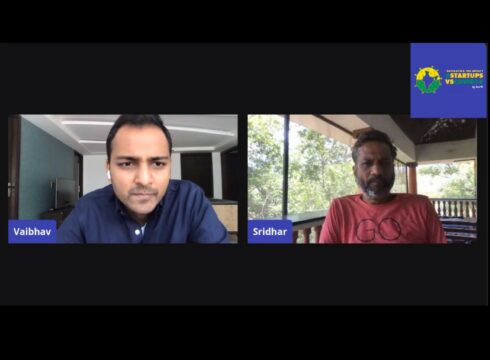SUMMARY
Vembu noted that digitising MSMEs is an opportunity as well as a challenge for SaaS startups
How businesses tackle Covid-19 challenges will define long-term success, Vembu believes
Vembu advised that having any paying customer during these times is better than only looking for high-value clients
Inc42 Daily Brief
Stay Ahead With Daily News & Analysis on India’s Tech & Startup Economy
Covid19 Tech Impact
Latest updates & innovations, in-depth resources, live webinars and guides to help businesses navigate through the impact of the COVID19 pandemic on India's economy.
Over the last two months, Indian entrepreneurs have been tasked with stretching their runway due to a prolonged funding winter expected to last over the next 12-18 months. So, every entrepreneur is busy being frugal, re-examining expenses and even laying off employees. Because if there is no business, how will they offer jobs— and that is the crux of the fight for survival.
Indian SaaS maverick, Sridhar Vembu, knows a thing or two about bootstrapping and growing business without external capital and market challenges. Having built Zoho in 1996 and seeing his fair share of crises over the decades, Vembu has been one of the few businessmen to have built a successful business without VC investment. But this Covid-19 crisis has hit a big reset button for India’s SaaS companies — from investments to clients — and the challenge has put undue pressure on the SaaS startups to prove their models.
Joining our ‘Ask Me Anything’ series and speaking to Inc42 cofounder and CEO Vaibhav Vardhan, Zoho CEO Vembu talked about the big shift awaiting Indian SaaS. The discussions were at length about the country’s digital abilities, Indian SMB challenges, delayed impact of Covid-19 and much more.
Tapping The SMB Wave
“A lot of work has to be done for Indian SMBs to tap into the MSME opportunity. I don’t think it’s going to be an easy game and all the massive global players are also here. India is a wide-open market so that is also a challenge,” he added.
Talking about the challenges of catering to MSMEs, Vembu said that these companies haven’t adopted technology much, so even though this is an opportunity, the challenges include extremely low price points, onboarding, regional and local support etc.
“The first thing to remember is Indian customers are extremely price-conscious, the most price-conscious so, we have to have very aggressive pricing. The second is support density is high in India, so you have to have a lot of volume in India.”
While the opportunity is undoubtedly big for SaaS startups, the key will be to offer customised pricing. Vembu recalled how Zoho offered its products for free for 3 months to customers, who have zero revenues. Expecting every SMB to pay the same for the SaaS subscription may not be realistic and businesses need to be flexible with contracts too, as having a paying customer is a big deal right now, and not all need to be high-value customers.
Selling Globally: A Challenge In Post-Covid19 World?
Vembu says that the landscape today is so different than six months ago that it’s barely recognisable. The crisis is not just economic in nature but also sociological. “We have to thread this needle wire— keep our optimism, invest in R&D, technology etc and at the same time, keep ourselves alive. That is threading the needle, and that is not an easy challenge that founders startups all must grapple with,” he added.
How businesses tackle these challenges will define who are the long-term players. Further, an additional challenge for Indian startups is a dependency of revenues outside-India, but given the geopolitical global landscape now, SaaS players aren’t sure if it is viable to build in India and sell abroad in the next 5-10 years.
“What is true today or what was true last year may not be true in five or 10 years, that is the reset scenario. Should Indian startups be looking to solve the challenges of a company in Chicago, versus a company in Coimbatore? Is that some intrinsic thing in romanticism about solving a problem in Chicago versus solving a problem in Coimbatore. These are the questions to ask. And these are the things that we will be forced to ask because of the evolving landscape, the geopolitical landscape.”
VCs Bringing Silicon Valley Model To India
Zoho CEO also talks about Silicon Valley models being replayed in India by the venture capitalists. Vembu says that this has two problems: talent availability and talent congregation. With talent availability, Vembu says that India doesn’t have a tech ecosystem to hire from. Further, India doesn’t have a large pool of people coming to the country to start companies so this makes the dynamics of startups different.
Which is why the Zoho founder is critical of applying the Silicon Valley playbook in India. Venture capitalists will fund companies selectively, and founders should plan for fundraising being tough and be judicious with expenses. Bootstrapping helps as it gets the startup used to working with less cash.
“But if you earned that thousand rupees from a customer actually teaches you a lot, so that is why bootstrapping helps and that fits with the Indian customer mindset to that value of money mind.”
Note: We at Inc42 take our ethics very seriously. More information about it can be found here.


